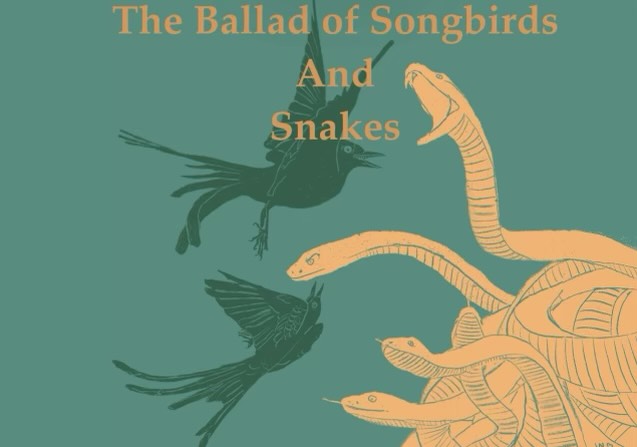*This review contains no plot-based spoilers.*
After massive anticipation from casual viewers and rabid fans alike, “The Hunger Games” prequel, “The Ballad of Songbirds and Snakes”, has finally been released in theaters.
I am a Hunger Games superfan. This movie is all I’ve been able to talk about for weeks, and while there are some cutbacks and character flaws I could nitpick, I am declaring myself a staunch fan of the film.
The film follows the events surrounding the 10th Hunger Games, through the eyes of future in-universe president Coriolanus Snow. Coriolanus is an ambitious student living in the Capitol, and one of the last remaining members of the once-powerful Snow family. When he is assigned to mentor District 12 tribute Lucy Gray Baird, his life changes irrevocably as he transforms into the monster we know him as in the original Hunger Games trilogy.
Pacing-wise, “The Ballad of Songbirds and Snakes” is a mad dash. It’s hard to cram a 500+ page book into one movie, and I sincerely respect the filmmakers for not trying to split it into two parts and instead maintain its integrity as a stand-alone. The film is spilt into three acts, and while the third act is well-paced, the first two could have benefited from an extra 10 minutes or so each.
Visually, the film is striking. Trish Summerville’s costumes are breathtaking – it’s no surprise she was invited back to the franchise after designing for “Catching Fire”, the second Hunger Games movie. From the eccentric fashions of mad scientist Dr. Volumnia Gaul to the splendor of Lucy Gray Baird’s iconic rainbow dress, Summerville yet again proves herself as one of the finest costume designers in Hollywood. The set for this movie adopts a sort of retro feel, replete with old-fashioned televisions and 60s-style interiors to contrast with the dystopian-futuristic world we find ourselves in.
Some fans may be disappointed at the number of characters and plot points left out of the movie, and indeed there are many. The source material is action-packed, and chock-full of details that vary from unsettling to nightmarish. However, either for the purposes of plot pacing or maintaining a PG-13 rating, most of these exclusions feel organic and necessary.
The original book is written in a limited 3rd person perspective, allowing us intimate insight into the inner workings of protagonist Coriolanus Snow. This insight reveals something about Snow that movie-watchers miss initially: he is a monster. Outside, he is cool, calm, an attractive young man with endless charisma and insurmountable odds. Inside, he is seething with a hatred for humanity so profound, it’s nearly unbearable by the time you’ve reached the book’s end.
But movies, unless narrated by the protagonist, do not have that same ability to put us inside a character’s head. Movie Coriolanus is a much different character for this reason – with Movie Coriolanus, the viewer’s antipathy towards him only manifests in earnest when he begins descending down the path of darkness and committing explicitly terrible acts against the people in his life. With Book Coriolanus, his subtle but ever-present prejudice, pretentiousness, and scheming have readers distrusting him by the end of the first chapter.
It’s important to note that both of these versions of him are good ones – the movie provides a feeling of betrayal seeing our protagonist slip through our fingers and become a villain, while the book provides a looming feeling of dread as we watch a fatally ambitious boy become a monstrous man. It’s the Macbeth question: is Coriolanus evil because of a series of circumstances that shape him? Or was there something evil in him all along?
This is in part because of a problem with the actor. Tom Blyth, who plays Coriolanus Snow, has only one true, glaring flaw – he is extremely beautiful. Fans have already begun stringing together slow-mo edits of Blyth’s performance, and the numerous scenes featuring him shirtless and sweating have bewitched viewers across the nation. We begin the movie biased in his favor, not only because we aren’t hearing his insidious internal monologue, but also because the man has eyes you could drown in and abs to come to shore on.
Jokes aside, Blyth’s performance as Snow is a fantastic one, and I sincerely hope to see his gorgeous face onscreen again in the future. Though at times flat and expressionless, Blyth shines in expressing the fury of a man consumed by the desire for control.
His co-star, Rachel Zegler, gives an equally thrilling performance. Zegler plays the incomparable Lucy Gray Baird, the leader of a band of wandering musicians and the female District 12 tribute for the 10th Hunger Games. Lucy Gray performs several songs throughout the film, all inspired by Appalachian folk music. Zegler has said that she sang the songs live on camera, rather than lip-syncing to a prerecorded track. These songs are available on Spotify, and have already racked up millions of listens (of which I am many).
The film’s supporting cast is one for the ages. Viola Davis’ performance as Dr. Volumnia Gaul is everything I could have dreamed of from an actress of her high caliber, and Peter Dinklage’s portrayal of Dean Casca Highbottom has me rethinking the character entirely.
The tributes themselves are fabulously compelling, and are given levels of complexity that force both the Capitol students and the real-life audience to recognize their humanity and feel their suffering deeply. Several tributes are played by actors who are disabled in real life – the actress playing Wovey has Down Syndrome, the actor playing Bobbin is missing part of his arm, etc. A major complaint of the original trilogy was that the films neglected to portray the disabilities of several major characters, and it seems that this movie seeks to right that wrong.
The bar set by the original Hunger Games movies is one so impossibly high, it seems a fool’s errand to try and make a prequel as good. Though I can’t say it quite meets that bar, “The Ballad of Songbirds and Snakes” is an overall triumph for the fandom, and about as good a movie adaptation as I could’ve hoped for. Recently, Hollywood has been letting me down, and this adaptation could have been a bloodbath (literally and figuratively). Instead, it’s gorgeous, tasteful, and an extremely satisfying addition to the world of Panem.
Suzanne Collins, the author of the series, could have milked “The Hunger Games” franchise for all it was worth. She could have written a dozen prequel stories about past Hunger Games, novellas about each tribute, spinoffs in every district, and fans would have gone wild. But she chooses instead to only expand upon the world of the series when it does something meaningful, when it does something new for the dystopia she has so carefully constructed. In my eyes, that solidifies her as one of the greatest authors of the 21st century. “The Ballad of Songbirds and Snakes” is a cautionary tale against hubris, against authoritarianism, against greed.
It raises the question over and over: What happens when we stop seeing people as people?










![The GHS/MERHS senior cross country runners pose together on Senior Night. [Photo courtesy of Manchester-Essex Athletics]](https://thegillnetter.com/wp-content/uploads/2025/10/Screenshot-2025-10-10-at-11.18.29-AM.png)























